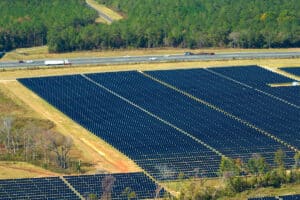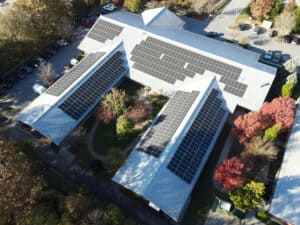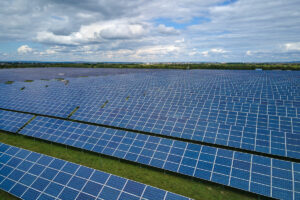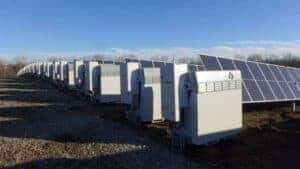Both flow and lithium ion batteries provide renewable energy storage solutions. Both types of battery technology offer more efficient demand management with lower peak electrical demand and lower utility charges. Key differences between flow batteries and lithium ion ones include cost, longevity, power density, safety and space efficiency. While both types of batteries can be beneficial to your company or organization, it is important to consider their differences in order to find the solution that works best for you. This article outlines these key differences between flow batteries and lithium ion ones so that you can make an informed decision regarding your next battery energy storage project.
What are flow batteries?
Flow batteries are ideal energy storage solutions for large-scale applications, as they can discharge for up to 10 hours at a time. This is quite a large discharge time, especially when compared to other battery types that can only discharge up to two hours at a time. The main difference that separates them from other rechargeable battery types, like lithium ion batteries, is their unique design. This design separates fluid into two exterior tanks, where electrons flow through electrochemical cells and a membrane that separates the electrons. The size of these exterior tanks determines the amount of electricity that can be generated; the larger the tank size, the larger the amount of electricity that can be generated.
Applications of flow batteries can include utilities, microgrids, and electric vehicles (EVs). Because of flow batteries’ long discharge capacity, larger applications like utilities or microgrids (smaller versions of electric grids that can operate independently) often utilize this battery storage technology. Flow batteries are an ideal solution for EVs because of their ability to quickly replace electrolyte liquid or “recharge.” Common materials found in flow batteries include vanadium and iron.
What are lithium ion batteries?
Lithium ion batteries is a leading rechargeable battery storage technology with a relatively short lifespan (when compared to flow batteries). Their design involves only one encased battery cell in which electrolytes mix with conductors to charge and discharge. This technology also has a relatively short lifespan and aren’t able to be fully discharged before “recharging” begins. A diagram of the charge and discharge process is pictured below.
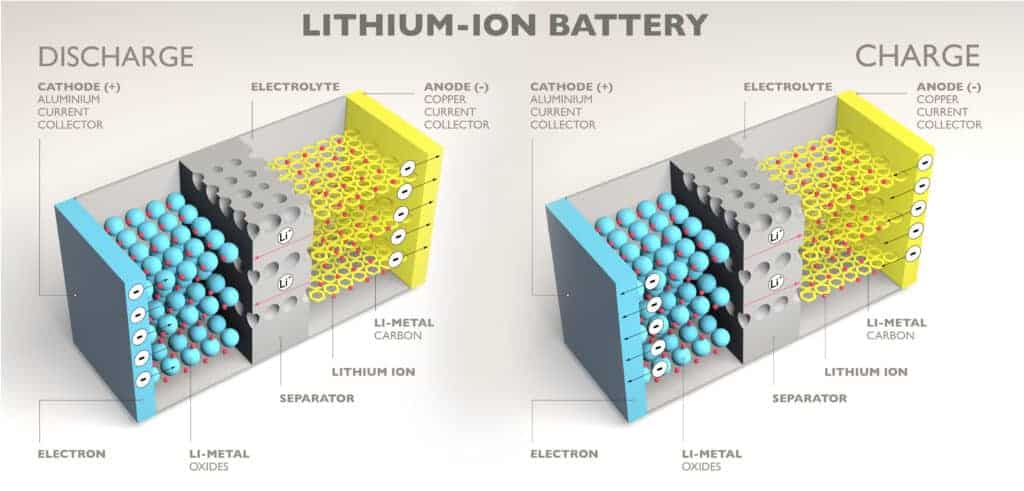
Lithium ion battery applications include emergency power back up or uninterruptible power supply (pictured with article title), solar power storage and surveillance or alarm systems in remote locations. Lithium ion batteries ability to quickly charge makes them ideal for these applications.
Key differences between flow batteries and lithium ion batteries
To expand on the differences between the battery technologies discussed above, we have outlined the five key differences between the two below. The differences between flow batteries and lithium ion batteries are cost, longevity, power density, safety and space efficiency.
1. Cost
Often considered one of the most important differences between flow batteries and lithium ion batteries is these technologies’ costs. Flow batteries have relatively low charge and discharge rates that require a relatively large surface area to occur. This, along with more pumps, plumbing and maintenance than lithium-ion batteries, and the industry immaturity of flow batteries makes them the more expensive option.
2. Longevity
Flow batteries have almost an unlimited battery cycle life because of the absence of phase-to-phase chemical reactions. This technology can by cycled every day for up to 30 years. This absence also means the absence of degrading material and therefore a longer life span. On the contrary, lithium ion batteries that are cycled every day will only last up to eight years.
3. Power Density
Flow batteries have a smaller power density than lithium-ion batteries but are ideal for consistent energy delivery (in a lesser amount than lithium ion batteries) for up to 10 hours (longer period of time than lithium ion batteries). Lithium ion batteries can deliver a relatively large amounts of energy, but these deliveries can only last for up to two hours.
4. Safety
Safety is another one of the differences between flow batteries and lithium ion ones that is considered the most important. Flow batteries are generally considered the safer technology because they don’t contain flammable materials, and the materials that they do contain, such as vanadium, are often environmentally friendly.
5. Space Efficiency
Flow batteries are heavier than lithium ion batteries and they also take up more space due to their considerably sized tanks. In comparison, lithium ion batteries are more portable and won’t take up as much of your space.
These key differences between flow batteries and lithium ion batteries can determine which technology is the best solution for your facility. In summary, if your main priority when it comes to battery energy storage systems is either longevity or safety, flow batteries are likely the ideal technology for you. If your main energy storage system priority is either cost or space efficiency lithium ion batteries are likely the idea technology for you. If power density is your main concern, either technology could suit your unique needs, depending on the length of battery cycle you require.
Interested in installing a battery energy storage system?
Are you interested in installing a battery energy storage system? Whether it be a flow or lithium ion system, EnergyLink’s team of experts will work with you to create a solution that fits your company’s unique needs. Our team will guide you through each phase of the installation: design, build and fund. To get started on a battery energy storage project, click the link below for a free quote. If you would rather speak with one of our team members, dial (866) 218-0380.

